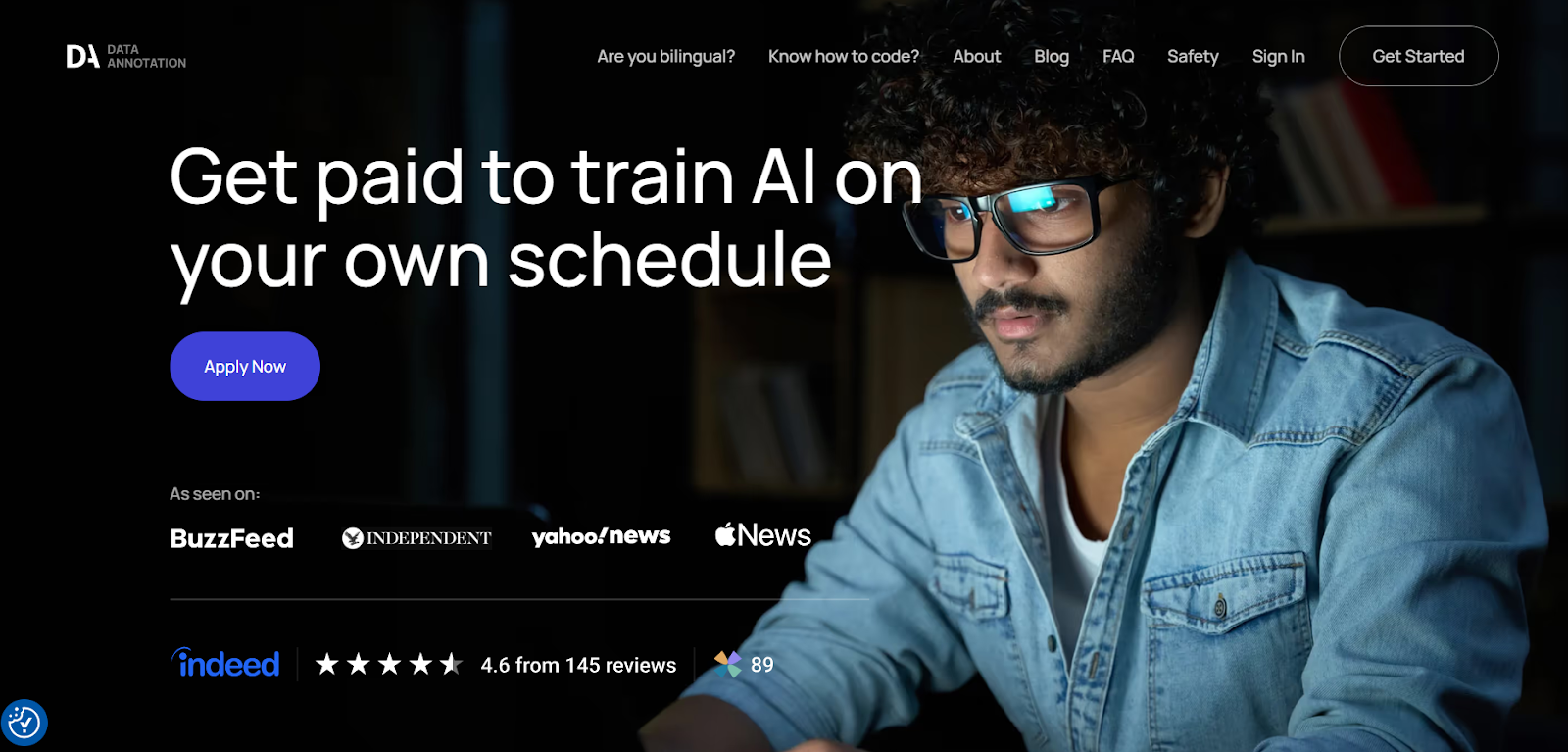Most AI trainer job postings now read like academic fellowship requirements: advanced degrees preferred, machine learning background required, strong analytical skills essential. Then, platforms use assessments that measure something completely different.
The disconnect explains why some PhD holders fail qualification tests while self-taught programmers pass, and why someone who reads widely and writes regularly can sometimes produce better training data than an English literature PhD.
This article breaks down what matters (quality judgment, domain fluency, systematic reasoning), what doesn't (credentials, ML knowledge, generic skills), and how assessment-based hiring actually works.
The AI training requirements that don't predict quality
Most job postings emphasize credentials and technical knowledge that look impressive but offer little insight into actual training performance. After evaluating thousands of AI trainers, we've identified three requirements that consistently fail to correlate with data quality — and sometimes predict worse outcomes.
Machine learning knowledge
The conventional wisdom: Trainers need strong ML fundamentals to understand model architectures, loss functions, and training pipelines.
What actually happens: ML knowledge often makes trainers worse at their jobs.
Here's why: Trainers with deep ML backgrounds instinctively optimize for what they've been taught matters — benchmark performance, loss reduction, interannotator agreement. These metrics look impressive in research papers. They predict almost nothing about whether models work in production.
The problem compounds when trainers understand enough ML to game evaluation metrics. They learn that making model responses longer improves perceived quality. Adding formatting and emojis boosts preference scores. Optimizing for these patterns produces models that excel at generating impressive-looking clickbait while failing at actual reasoning tasks.
What actually matters: Understanding the training-inference gap — why models that perform well on academic benchmarks fail at real-world tasks. This requires judgment about objectives rather than technical knowledge about architectures.
Advanced degrees
The conventional wisdom: PhDs in relevant fields bring deep expertise and rigorous thinking to training tasks.
What actually happens: From our experience, credentials sometimes correlate weakly with data quality. Sometimes they predict worse performance.
Emily Dickinson never finished college. Ernest Hemingway had no formal training in literature. Yet both produced work that defines entire genres. Meanwhile, countless English literature PhDs struggle to write engaging prose.
The credential-quality gap widens for creative and evaluative tasks. When training language models to write poetry, a PhD in English literature can predict nothing about whether someone can distinguish a haiku that captures moonlight on water from generic verse about "the moon's pale glow."
The person with street smarts (who reads widely, writes regularly, and has developed taste through exposure) consistently outperforms the credentialed expert.
What actually matters: Domain fluency combined with what we call "street smarts"—the practical intuition, creative judgment, and mental fortitude to solve problems credentials don't capture.
Generic analytical skills: missing the point
The conventional wisdom: Strong logical reasoning, attention to detail, and systematic problem-solving predict training performance.
What actually happens: These capabilities matter, but most descriptions miss what trainers actually need to analyze.
Job postings emphasize "breaking down complex problems" and "identifying patterns." That's table stakes. The more complex skill is recognizing when you're reinforcing the wrong patterns — when a model optimizes for what looks good rather than what is good.
The ability to compare two responses doesn't translate into the ability to evaluate whether either response is actually correct.
What actually matters: Quality judgment that distinguishes "looks impressive" from "achieves the objective." This requires understanding not just how to analyze individual examples, but how to spot when systematic patterns in your evaluations will train models toward the wrong behaviors.
The AI trainer requirements that matter for AGI
The capabilities that actually predict training quality are difficult to screen through traditional hiring processes. These four competencies separate trainers who advance frontier model capabilities from those who waste compute optimizing the wrong objectives.
Understanding quality ceilings
The most essential concept most trainers never learn: different tasks have different quality ceilings, and ceiling height determines how much expertise matters.
For example, drawing a bounding box around a car has a low ceiling. A second-grader can do it as well as Terrence Tao. The box you draw will be roughly identical to the box anyone else draws — there's minimal room for expertise to improve outcomes.
Writing poetry about the moon has an unlimited ceiling. Nobel laureates produce fundamentally different work from high schoolers. Each person brings a unique perspective, voice, and craft that creates distinct value.
As AI models become more capable, training tasks shift toward higher ceilings. Models no longer need help with simple classification — they need humans who can write nuanced creative work, solve novel physics problems, evaluate complex reasoning chains, and provide feedback that captures subjective quality dimensions.
Trainers who understand quality ceilings recognize when a task requires deep expertise versus when it can be automated or scaled cheaply. They invest effort where it matters and avoid wasting time on commodity work.
Objective vs. subjective judgment
Most training guidance treats data annotation like a mechanical process: "Check these boxes, follow these rules, maintain consistency." This works for low-ceiling tasks. It fails catastrophically for anything that requires human judgment.
Consider training a model to write poems about the moon.
- One poem might be a haiku focusing on moonlight reflected in water
- Another poem might use internal rhyme and meter
- A third might explore the emotional weight of a moon rising at night. Which is "best"?
There isn't a single correct answer. Each poem offers different insights into language, imagery, and human expression. Training models on data where annotators impose false objectivity (finding the "right" poem through interannotator agreement) produces models that collapse into boring, generic outputs.
High-quality trainers embrace subjectivity where appropriate. They understand that diversity in preferences, interpretations, and judgments teaches models richer patterns than forced consensus ever could.
Visceral understanding of data
The phrase "visceral understanding of data" captures something most trainers lack: the instinct to actually look at what they're producing rather than trust the process.
At new tech companies, ML engineers routinely train models without examining training data beyond summary statistics. They check loss curves, benchmark scores, and deployment metrics. They don't read through 100 consecutive examples to spot systematic issues.
They don't compare model outputs side-by-side to understand subtle quality differences. They don't notice when automated filters systematically remove the most interesting examples.
This creates a blindness that compounds through the training pipeline. Trainers who never develop visceral data sense can't spot when they're reinforcing problematic patterns. They trust that following the rubric produces quality data. Meanwhile, the rubric itself optimizes for the wrong objectives, and nobody notices because nobody actually reads the data.
Developing this sense requires deliberate practice: reading hundreds of examples, comparing your judgments with those of other skilled trainers, noticing when your initial instincts are wrong, and building pattern recognition for what good data feels like before any metrics confirm it.
Scalable oversight intuition
As models surpass human performance on benchmark tasks, training methods must evolve. The future belongs to trainers who understand scalable oversight — using AI tools to enhance human judgment rather than replacing it.
This manifests practically: Instead of writing training examples from scratch (time-consuming, limited by human speed), skilled trainers edit model-generated drafts, preserving efficiency while adding human creativity and error correction.
Instead of labeling every edge case manually, they identify patterns in model failures and design targeted interventions.
The key is understanding where human intelligence adds value versus where it's redundant. A trainer with scalable oversight intuition recognizes: "This task needs my creativity," or "This evaluation requires my judgment," or "This process would benefit from model assistance while I focus on verification."
This capability separates trainers who scale their impact from those who hit throughput ceilings. And it's nearly impossible to screen for in traditional hiring processes.
How to develop what AI training requires
You can't degree your way into quality judgment. You build it through deliberate practice: comparative analysis, recognition of measurement failures, and domain fluency beyond credentials. Here are the specific exercises that compound your capabilities faster than formal training.
Build quality judgment through comparative analysis
The fastest path to developing quality intuition: systematic comparison of examples at different quality levels.
Find datasets labeled by both novices and experts. Study the differences.
For instance:
- Why did the expert annotator make that choice?
- What did the novice miss?
- Which details matter and which are distractions?
For language tasks, compare AI-generated text across different models and temperature settings. Which responses look fluent but contain subtle errors? Which follow instructions precisely but feel stilted? Which balances competing objectives effectively?
For technical tasks, examine code that passes tests but exhibits bad practices. Study mathematical proofs that are technically correct but pedagogically unclear. Analyze scientific arguments that cite appropriate sources but draw unsupported conclusions.
This comparative work builds the pattern recognition that credentials can't provide. You develop taste — the ability to spot quality before running formal evaluations.
Practice identifying measurement failure
Quality measurement systems frequently optimize for the wrong thing. Learning to spot these failures protects you from reinforcing problematic patterns.
Study examples where metrics diverge from actual quality:
- Find model outputs with high automated scores but obvious human-visible flaws
- Identify cases where interannotator agreement is high, but both annotators missed the same critical error
- Compare benchmark-optimized models against their performance on real-world tasks
- Track how models degrade when trained exclusively on synthetic data
Each divergence teaches you something about what quality metrics miss. Over time, you develop skepticism toward standard measures and intuition about when they'll lead training astray.
Develop domain fluency beyond credentials
For specialized domains (medicine, law, finance, STEM fields), credentials provide baseline legitimacy but don't guarantee training performance.
You can build actual fluency through:
Active reading in the field: Not just papers or textbooks, but primary sources that reveal how experts actually think. Read legal opinions, not just summaries. Study actual mathematical proofs, not just theorem statements. Examine real clinical documentation, not just textbooks.
Exposure to edge cases: Experts distinguish themselves by handling unusual situations correctly. Collect examples of weird edge cases in your domain. Study how they differ from typical examples. Understand the reasoning that differentiates correct from incorrect handling.
Cross-domain connections: Often, the best domain fluency comes from seeing how concepts transfer across fields. A chemist who understands statistical mechanics brings different insight than one who only knows organic chemistry. A legal expert with an engineering background spots issues that pure legal training misses.
Cultivate contrarian instincts
The most valuable trainers question conventional approaches. They ask: "Is this actually teaching the model useful patterns, or are we optimizing for what's measurable?"
Build this capability by examining industry consensus critically:
- When everyone focuses on a particular benchmark, ask what it fails to measure
- When standard practice emphasizes speed, question what quality losses it creates
- When evaluation relies on simple metrics, investigate what nuance they miss
- When training methods produce expected results, probe whether those results transfer to real applications
This doesn't mean rejecting all standard approaches. It means developing the intellectual independence to separate what works from what just looks good — and the courage to argue for better approaches even when they're more complicated to explain.
How to get an AI training job?
We need trainers who understand that their judgments compound through training pipelines, and know how AI systems behave when deployed to millions of users. Not everyone typing responses grasps this.
At DataAnnotation, we operate through a tiered qualification system that validates expertise and rewards demonstrated performance.

Entry starts with a Starter Assessment that typically takes about an hour to complete. This isn't a resume screen or a credential check — it's a performance-based evaluation that assesses whether you can do the work.
Pass it, and you enter a compensation structure that recognizes different levels of expertise:
- General projects: Starting at $20 per hour for evaluating chatbot responses, comparing AI outputs, and writing challenging prompts
- Multilingual projects: Starting at $20 per hour for translation and localization work across many languages
- Coding projects: Starting at $40 per hour for code evaluation and AI performance assessment across Python, JavaScript, HTML, C++, C#, SQL, and other languages
- STEM projects: Starting at $40 per hour for domain-specific work requiring bachelor's through PhD-level knowledge in mathematics, physics, biology, and chemistry
- Professional projects: Starting at $50 per hour for specialized work requiring credentials in law, finance, or medicine
Once qualified, you select projects from a dashboard showing available work that matches your expertise level. Project descriptions outline requirements, expected time commitment, and specific deliverables.
You can choose your work hours. You can work daily, weekly, or whenever projects fit your schedule. There are no minimum hour requirements, no mandatory login schedules, and no penalties for taking time away when other priorities demand attention.
The work here at DataAnnotation fits your life rather than controlling it.
Explore an AI trainer job at DataAnnotation
For those who want meaningful work: this is the craft of advancing AI capabilities. The expertise you bring (whether domain knowledge, quality judgment, creative intelligence, or systematic reasoning) directly shapes what these systems can do. That's not job requirement checkboxes. That's contributing to building technology that changes what's possible.
Getting from interested to earning takes five straightforward steps:
- Visit the DataAnnotation application page and click “Apply”
- Fill out the brief form with your background and availability
- Complete the Starter Assessment, which tests your critical thinking and attention to detail
- Check your inbox for the approval decision (which should arrive within a few days)
- Log in to your dashboard, choose your first project, and start earning
No signup fees. We stay selective to maintain quality standards. Just remember: you can only take the Starter Assessment once, so prepare thoroughly before starting.
Apply to DataAnnotation if you understand why quality beats volume in advancing frontier AI — and you have the expertise to contribute.






